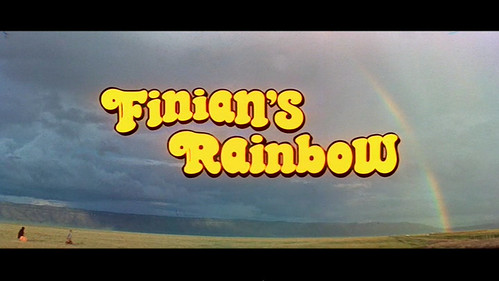"Films are like haiku; they express a thought or an emotion in very few words and using just the being of the actors to do it."
—Francis Ford Coppola, from the director's commentary of "Finian's Rainbow"

I recently finished Moviemakers' Master Class by Laurent Tirard, a book I picked up in Cannes during the film festival last year. Over the course of reading, I compiled a short list of films I had to watch for homework. One of those films came from this quote by Ethan Coen:
"I remember when we worked with Nicolas Cage on Raising Arizona, we talked about his uncle, Francis Ford Coppola, and told him that Finian's Rainbow, which hardly anyone has ever seen, was one of our favorite films. He told his uncle, who I think has considered us deranged ever since."
So obviously I put down the book and Netflixed Finian's Rainbow. Have you heard of it? No, no you haven't. No one has. It may as well be a Mystery Science Theater 3000 special, except that would've distinguished it some. So I watched it. Actually, I couldn't finish it. I shut it off about when the creepy male lead Woody is romancing his way into Petula Clark's heart by forcing himself on her in the woods at midnight. (They called that courting back in the day.) But today I put on the commentary by Francis Ford Coppola, and found it to be an excellent experience. Much better than watching the belabored 145 minute musical itself.
In the commentary, Coppola explains how he got the job directing the Warner Brothers musical — Fred Astaire's final pic — at age 29, with only a thesis film under his belt. He also critiques his job as a young director, musing how the young Coppola thought his job was to invent subplots and tell the actors where to go. The experienced Coppola says, rather, it was his job to pare down the film to its essence and help the actors follow their best impulses. His commentary nicely complements Tirard's book, which conspicuously lacks a chapter on Coppola.
The movie is overlong, though beautiful and swelled with earnest musical naïveté. A leprechaun turns mortal when his pot of gold is stolen. A mute girl dances to communicate what she can't speak. A racist senator is turned into a black man on a magical wish. You know, musical stuff.
It's an ambitious film, stuck squarely in the tradition of big musicals but with progressive aims and exhausted stereotypes living in awkward coexistence. Coppola tells us what we really want to hear — how his young career dovetailed with the old Hollywood style before departing on a different course of small, personal films, shot on location with handheld cameras, aggressively telling the truth. If nothing else, the movie is worth seeing just for the opening credits, a gorgeous montage of American panoramas from coast to coast. But more to see the curious foundation that launched Coppola's career.

No comments:
Post a Comment